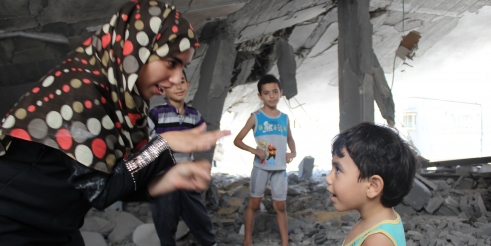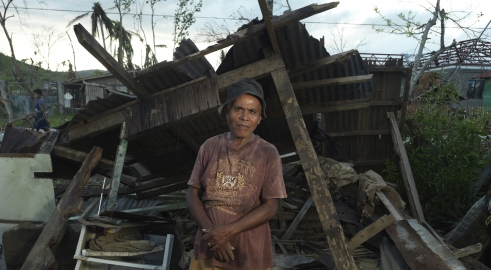NOTE: The Humanitarian inclusion standards for older people and people with disabilities were updated in February 2018. Please download the new documentation.
By Irene Van Horssen
HelpAge International has worked with six other agencies to launch a new set of minimum standards to support ageing and disability-inclusive responses in humanitarian crises.
Some 12.3% of the world’s population are aged 60 and over, while 15% are living with some kind of disability. The share of older people in the population is growing, while the risk of disability often increases in conflicts and disasters. These people, therefore, make up a significant and growing proportion of disaster-affected communities.

The Minimum Standards for Age and Disability Inclusion in Humanitarian Action are intended to inform humanitarian organisations about the actions needed to ensure their responses are as inclusive as possible. It’s comprised of key standards and includes sections on shelter, nutrition, food security and livelihoods, education, health and protection.
“These new minimum standards provide guidance to allow humanitarian actors to review, develop and monitor their progress in supporting the needs of these two highly vulnerable groups”, said Justin Derbyshire, Director of Programmes at HelpAge International.
“As such they make a direct contribution to support the quality and accountability of future humanitarian programming.”
In June 2015, the Global Protection Cluster reported that in Ukraine, 59% of registered internally displaced people were older. In 2014, HelpAge International and Handicap International reported that 22% of Syrian refugees in Jordan and Lebanon were suffering from some kind of impairment. This figure rose to 70% among older people.
Yet both groups continue to face difficulties accessing humanitarian assistance and protection despite growing evidence of the risks they face in disasters and conflicts.
The document draws on existing standards, including the Core Humanitarian Standard on Quality and Accountability, the Sphere Handbook, and the Sphere Companion Standards, as well as materials developed by specialist age and disability agencies.
Providing practical support
Christine Knudsen, Director of The Sphere Project, welcomed the document, recognising the role it can play in supporting humanitarian service delivery: “With the publication of these minimum standards for age and disability, practitioners and organisations have even stronger support and clear illustrations of what this means in practice and what actions can be taken.”

Paul Valentin, International Director at Christian Aid, added: “The standards give practical support and advice on how to adapt emergency responses to meet the needs and build on the capacities of those who are often left out in disasters.
“The clear guidance and format gives extra depth to the core Humanitarian Standards and will go a long way to help us support our partners in inclusive programming.”
Dr M Ashmawey, Chief Executive Officer of Islamic Relief, also praised the document: “This report will add value to the response and guide humanitarian workers to fully achieve impartiality and humanitarian principles.”
The ADCAP programme
The Minimum Standards for Age and Disability Inclusion in Humanitarian Action has been developed as part of the Age and Disability Capacity Building (ADCAP) programme, led by HelpAge International as part of a portfolio of capacity strengthening projects under the Start Network.
ADCAP is an initiative of the Age and Disability Consortium, a group of seven agencies working to promote age and disability inclusive humanitarian assistance: CBM, DisasterReady.org, Handicap International, HelpAge International, IFRC, Oxford Brookes University and RedR UK. The programme is funded by the UK Department for International Development (DFID) and the United States Agency for International Development (USAID).
